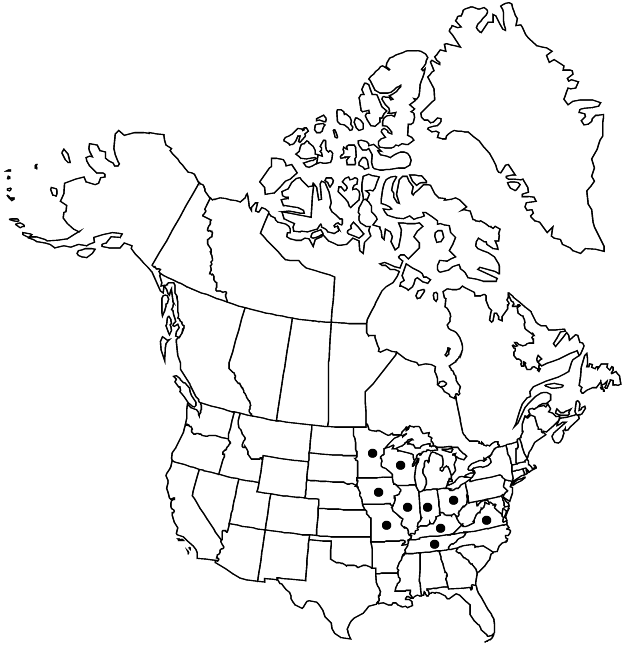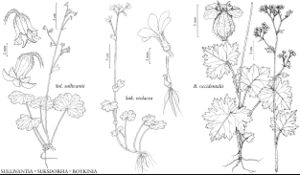Difference between revisions of "Sullivantia sullivantii"
Mem. Torrey Bot. Club 5: 178. 1894,.
FNA>Volume Importer |
imported>Volume Importer |
||
| (5 intermediate revisions by 2 users not shown) | |||
| Line 6: | Line 6: | ||
|place=5: 178. 1894, | |place=5: 178. 1894, | ||
}} | }} | ||
| − | |basionyms={{Treatment/ID/ | + | |special_status={{Treatment/ID/Special_status |
| + | |code=F | ||
| + | |label=Illustrated | ||
| + | }}{{Treatment/ID/Special_status | ||
| + | |code=E | ||
| + | |label=Endemic | ||
| + | }} | ||
| + | |basionyms={{Treatment/ID/Basionym | ||
|name=Saxifraga sullivantii | |name=Saxifraga sullivantii | ||
|authority=Torrey & A. Gray | |authority=Torrey & A. Gray | ||
| + | |rank=species | ||
| + | |publication_title=Fl. N. Amer. | ||
| + | |publication_place=1: 575. 1840 | ||
}} | }} | ||
|synonyms={{Treatment/ID/Synonym | |synonyms={{Treatment/ID/Synonym | ||
|name=Saxifraga renifolia | |name=Saxifraga renifolia | ||
|authority=Rosendahl | |authority=Rosendahl | ||
| + | |rank=species | ||
}} | }} | ||
|hierarchy=Saxifragaceae;Sullivantia;Sullivantia sullivantii | |hierarchy=Saxifragaceae;Sullivantia;Sullivantia sullivantii | ||
| Line 36: | Line 47: | ||
-->{{#Taxon: | -->{{#Taxon: | ||
name=Sullivantia sullivantii | name=Sullivantia sullivantii | ||
| − | |||
|authority=(Torrey & A. Gray) Britton | |authority=(Torrey & A. Gray) Britton | ||
|rank=species | |rank=species | ||
| Line 50: | Line 60: | ||
|publication title=Mem. Torrey Bot. Club | |publication title=Mem. Torrey Bot. Club | ||
|publication year= | |publication year= | ||
| − | |special status= | + | |special status=Illustrated;Endemic |
| − | |source xml=https:// | + | |source xml=https://bitbucket.org/aafc-mbb/fna-data-curation/src/2e0870ddd59836b60bcf96646a41e87ea5a5943a/coarse_grained_fna_xml/V8/V8_242.xml |
|genus=Sullivantia | |genus=Sullivantia | ||
|species=Sullivantia sullivantii | |species=Sullivantia sullivantii | ||
Latest revision as of 22:42, 5 November 2020
Plants not stoloniferous. Flowering stems 5–40 cm, erect to ascending. Leaves: blade 1–12 cm wide, 1–2 times toothed, 7–13-lobed for 1/4–1/2 length to shallowly and somewhat irregularly 7–25-lobed; lobes cuneate-oblong to crenate and 1–2 times denticulate to coarsely subcrenulate, margins erose with long bristles to lacinate. Inflorescences erect to decumbent, primary and higher-order branches ascending relative to central axis. Flowers: hypanthium tubular-campanulate, portion distal to adnation to ovary not marked by conspicuous flaring, 1.3–3.2 × 1.2–2.1 mm, stipitate-glandular proximally; sepals triangular-ovate to lanceolate-oblong, not as broad as long at apex, 0.8–1.5 × 0.6–1.1 mm, apex acute; petals unlobed, 1.7–3.5 mm, ovate and abruptly narrowed in claw to lanceolate and gradually narrowed into claw, 0.7–1.6 mm wide; ovary ca. 1/2 inferior. Capsules cylindric-ovate to cylindric-elliptic, 3–7.5 × 1.3–3.2 mm, beaks ± spreading. Seeds usually tan, rarely red-brown, 0.7–1.2 × 0.2–0.5 mm, main body (excluding winged margins) 0.4–0.7 mm. 2n = 14.
Phenology: Flowering May–Jul.
Habitat: Moist limestone and sandstone cliffs
Elevation: 300-700 m
Distribution

Ill., Ind., Iowa, Ky., Minn., Mo., Ohio, Tenn., Va., Wis.
Discussion
Selected References
None.
